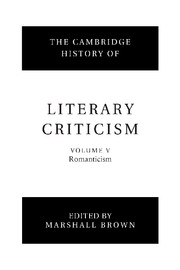Book contents
- Frontmatter
- Introduction
- 1 Classical standards in the period
- 2 Innovation and modernity
- 3 The French Revolution
- 4 Transcendental philosophy and Romantic criticism
- 5 Nature
- 6 Scientific models
- 7 Religion and literature
- 8 Language theory and the art of understanding
- 9 The transformation of rhetoric
- 10 Romantic irony
- 11 Theories of genre
- 12 Theory of the novel
- 13 The impact of Shakespeare
- 14 The vocation of criticism and the crisis of the republic of letters
- 15 Women, gender and literary criticism
- 16 Literary history and historicism
- 17 Literature and the other arts
- Bibliography
- Index
- References
13 - The impact of Shakespeare
Published online by Cambridge University Press: 28 March 2008
- Frontmatter
- Introduction
- 1 Classical standards in the period
- 2 Innovation and modernity
- 3 The French Revolution
- 4 Transcendental philosophy and Romantic criticism
- 5 Nature
- 6 Scientific models
- 7 Religion and literature
- 8 Language theory and the art of understanding
- 9 The transformation of rhetoric
- 10 Romantic irony
- 11 Theories of genre
- 12 Theory of the novel
- 13 The impact of Shakespeare
- 14 The vocation of criticism and the crisis of the republic of letters
- 15 Women, gender and literary criticism
- 16 Literary history and historicism
- 17 Literature and the other arts
- Bibliography
- Index
- References
Summary
The impact of Shakespeare on Romantic literary criticism may be measured in at least three ways. First, his place in the canon: starting in the later eighteenth century, a transformation in taste, led and articulated by critical writings, radically changed the value of Shakespeare. In the world of culture and learning, Shakespeare ceased to be primarily a source of pleasure and of interest almost exclusively in England; he became by the 1830s a universal genius known and admired, throughout the West, for his deep insight into the human condition. His newly exemplary pedagogical value made Shakespeare the basis for England's educational mission in India. Shakespeare's cultural destiny was thus linked to Britain's rise to world power in the decades from the Seven Years' War through the Napoleonic struggles; Britain's wars against France counterpointed and reinforced the challenge Shakespeare offered to the literary values of the French neoclassicism that dominated European thought for more than a century. Second, the place of Romantic critics in the canon of Shakespeare studies: German works by August Wilhelm Schlegel and English works by Samuel Taylor Coleridge and William Hazlitt are landmarks that still serve as points of departure for fresh thinking nearly two centuries later. Third, Shakespeare was a crucial starting point for important Romantic writers as they made innovative contributions in poetry and fiction, as well as in literary criticism and theory: Johann Wolfgang von Goethe, Friedrich Schlegel, John Keats, Herman Melville.
- Type
- Chapter
- Information
- The Cambridge History of Literary Criticism , pp. 272 - 295Publisher: Cambridge University PressPrint publication year: 2000
References
- 3
- Cited by

